- Homepage
- Our natural honey
- Do Some Vegans Eat Honey
Do some vegans eat honey?
Do some vegans eat honey and why would they not? After all they are into natural living and avoiding foods like meat, eggs and dairy; or any other products that are derived from animals. They need nuts, seeds and fruit utterly dependent on bees for pollination.
But what about products from the honeybee? Insects are animals after all.
And do keepers not exploit the bees in the same way as a dairyman takes milk destined for the calf from the mother cow?
These are ticklish questions and there are certainly many ifs and buts. And I need to be cautious since I am not a vegan. But my grandfather certainly was and it was he who introduced me to beekeeping; and a love of honey and an appreciation of the benefits of pollen, particularly for the prostate gland.
Vegan principles
1. The principle of the emancipation of animals from exploitation by man.
2. To seek an end to the use of animals by man for food, commodities and work.
3. And by all other uses involving the exploitation of animals by man; hunting and vivisection, for example.
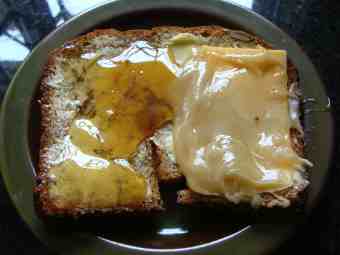 Bread, cheese and honey
Bread, cheese and honeyMy grandfather, the vegan beekeeper
My grandfather, no question of it, was more or less a vegan long before the term was commonly used. He would not wear leather belts or shoes, for example. A professor of the local university and principal of a teachers' training college nearly a hundred years ago he realised the toxic effect that sugar had on human health. So he turned to honey for sweetening and introduced his family to beekeeping.
Three of his grandchildren are serious beekeepers. He gave me my first hive when I was 9 or 10 years old.
Having been greatly traumatised by the need to kill horses for food during the siege of Ladysmith he became a life-long vegetarian. Many of his descendants still eat no meat and we personally are "flexitarians." We enjoy chicken and fish periodically and very occasionally free-range beef, pork or mutton. We get most of our protein from legumes, eggs and dairy products; and nuts and seeds.
We still eat no more than a teaspoon or two of sugar daily, mainly in homemade jams with a very occasional splurge on chocolate or ice-cream on high and holy days.
Is honey of animal origin?
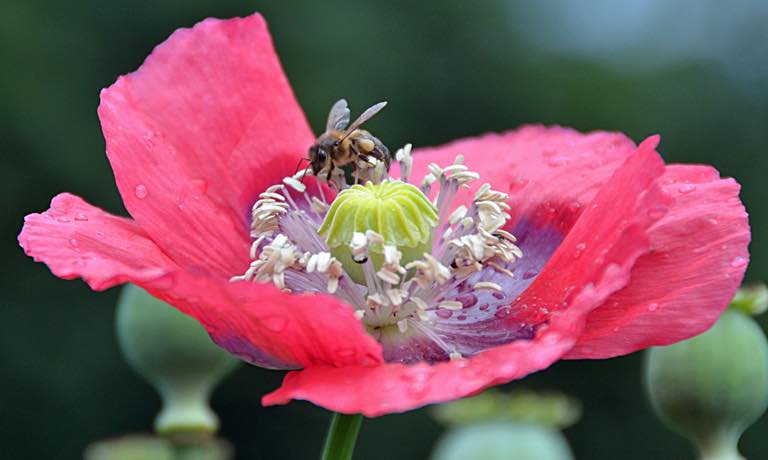
The bee's honey stomach
The reasoning behind why some vegans eat honey gets ticklish now. A bee has a special stomach which it fills with nectar and adds many unique nutrients; but doesn't digest it in the way that a cow processes grass to produce milk.
The nectar from the flower is then regurgitated into the cells in the combs when the bee gets back to the hive. There are no milk glands or ovarian ducts. So is honey of animal origin or not?
Has the bee digested the honey and pollen or has she simply transported it back to the hive, adding certain nutrients in a not dissimilar way to the baker supplying salt, yeast and water when making his loaf?
Is that baker not just an animal that we are exploiting to produce bread for us?
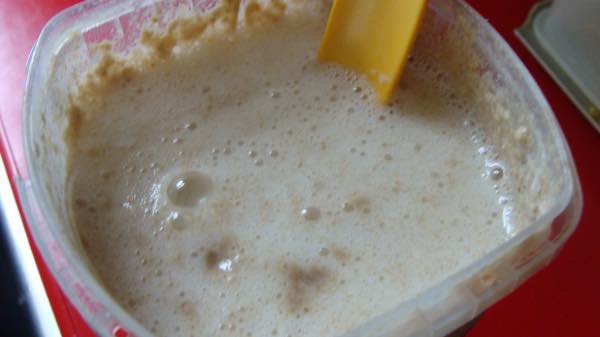 The baker adds sourdough, the bee her multiplicity of nutrients. Neither digest their products before offering them to us.
The baker adds sourdough, the bee her multiplicity of nutrients. Neither digest their products before offering them to us.Yes just as milk comes from a cow that eats grass, honey is produced by bees that feed on the nectar and pollen from flowers. So why is there any debate?
Humans can survive without milk or honey, so that's not an issue. Vegans are consistent in believing we should eat neither.
If every cow on the planet was suddenly to die, humans would certainly survive. Grumpy for sure without cheese, yoghurt and butter; but given that cattle make a massive contribution to greenhouse gases, global warming and fresh-water shortages, we might actually be better off.
Pollination
But if every bee was suddenly to die, almost every creature and a great many plants would be negatively affected in one way or another. For her real importance is not honey; it's pollination.
How does that come into the equation? Well vegans claim that humans exploit cows for their own purposes, which is true; and the planet might be better off if there were no more cattle than zebras.
But if we did not exploit honeybees almost every aspect of life would be negatively influenced; they contribute at least one fifth of all the pollination of what we eat. Some foods like almonds, plums and blueberries where mass flowering occurs for a short period would be very seriously affected.
If we all became vegans overnight, beekeeping would go into serious decline. Or would it? How important is honey in the industry?
Unlike cattle, humans only take of the surplus that the bees produce. If it was not harvested from the hives those colonies would soon become "honey-bound" leaving little room for the queen to lay her eggs.
Swarming would increase massively with bees nesting in every nook and cranny; in many roofs and under diverse bathtubs with an air-vent. Soon they would be declared vermin despite their pollination services.
“If the bee disappeared off the face of the Earth, man would only have four years left to live.”
- attributed but unconfirmed to Albert Einstein.
Keepers argue that if humans were to entirely stop eating honey, bee populations would be seriously undermined; most of us service our human desire for sweet food rather than pollination of plants. There would certainly be few almonds or blueberries for vegans to enjoy; nor should they by their own principles.
Vegans, almonds and soybeans
"More bees die every year, mostly in pollinating the almonds crop in the US than all other fish and animals raised for slaughter combined."
To be consistent in their belief that humans should eat no honey, vegans should also eschew almonds and blueberries, for example, pollination of which contributes to billions of bee deaths.
Personally I am not a supporter of the mass monoculture production of crops such as the almonds in California; it's counter to our backyard permaculture philosophy. But apparently some 80% of the worldwide supply is grown in the great Central Valley. It is not environmentally sound and cruel to the honeybees.
In these days of industrial agriculture it has become impossible for vegans to be wholly true to their beliefs; almost all foods are pollinated by managed bees. Even growing their own fruit and vegetables as we do, there would most likely be an apiary not far off that is compromising their code of honour.
Nor should they consume soybean products which are also but to a lesser extent, dependent on bees for pollination; and because of the devastation of the Amazon jungle, clearing vast areas for planting these increasingly important legumes for both vegans and animal fodder.
The material expressed on this page is gleaned from the nutritional and environmental literature; it is clearly referenced. A plain distinction is made between the author's opinion and that which is scientifically proven. When in doubt consult your health professional.
To suggest a correction or clarification, write to Dr Bernard Preston here. Contact.
Honey and the Bible
"Pollen is one of the bee products including honey, propolis and wax mentioned in the Talmud, the Old and New
Testaments of the Bible as healers of diseases; and the Holy Quran[3]."
Biblical Israel, the Promised Land was of course described as a place of milk and honey. That in itself naturally is no argument for or against beekeeping but it does give one cause to stop and ponder.
There are many positive comments in the Bible about bees, not least that John the Baptist, the greatest man ever born according to Jesus, ate locusts and honey.
Do some vegans eat honey?
I'm unsure how this would affect Jews and Christian wanting to join vegans who abhor enjoying any food of animal origin.
"Now John wore a garment of camel's hair and a leather belt around his waist; and his food was locusts and wild honey."
- Matthew 3
“Verily I say unto you, among them that are born of women there hath not risen a greater than John the Baptist."
- Matthew 11
Wild honey would no doubt have still been in the comb.
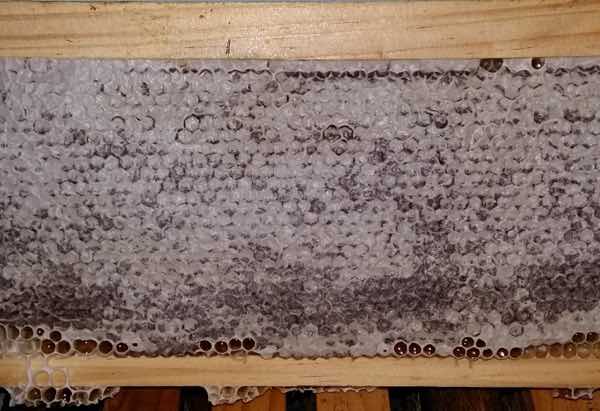
Adulteration of honey
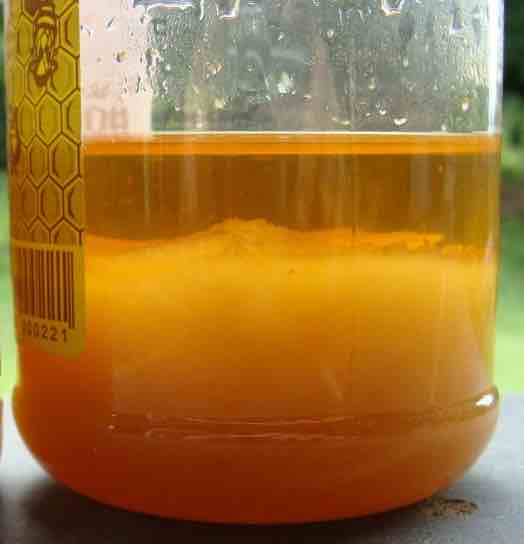 Separation is a good sign to beware of.
Separation is a good sign to beware of.The milk and honey of biblical times of course are both quite different to those found on grocery store shelves today. Along with olive oil, they are the most adulterated foods of the world. That too should cause us to stop and consider.
Do some vegans eat honey?
Do some vegans eat honey is a question that mystifies thinking people; and for good reason. Beekeeping like all of agriculture is full of controversy. It never does us any harm to stop and ponder. It has been said the mature mind can entertain thoughts that it doesn't necessarily hold to.
Natural honey has a low glycemic index; once processed by bottlers the GI rises dramatically[1]. We would all benefit by joining the vegans and eschewing most of that found in grocery stores.
Kidney stones
"Bee Pollen Extracts prevent and ameliorate the elevation of inflammatory markers and histopathologic changes used to identify kidney injury compared to controls[3]."
Vegans are significantly more prone to kidney stones; however this is not true of their fellows who also eschew all meat but do enjoy eggs, dairy products and natural honey giving them conversely a protective benefit[2].
This may be because of the influence of bee pollen that researchers have shown has a diuretic effect, increasing urine flow.
Why do some vegans eat honey but others avoid this natural food?
"We have found that natural honey containing pollen, propolis and various polyphenols causes a considerable increase in urine flow not dissimilar to Thiazide diuretics but with a potassium-sparing effect[3]."
Vegans and sugar
So vegans who turn their backs on natural honey but indulge in large amounts of sugar for sweetening are deluding themselves if they consider it health-giving. The kidney stones they and many carnivores too, suffer from are from refined carbs and not the spinach they love.
Pull the sweet tooth
All of us need to pull the sweet tooth; simple sugars are potentially very detrimental to human health. A possible exception is natural honey but even we as beekeepers eat no more than perhaps 3 or 4 teaspoons a day.
We eat almost no sugar except for that in homemade jams and jellies; and the occasional indulgences on high and holy days.
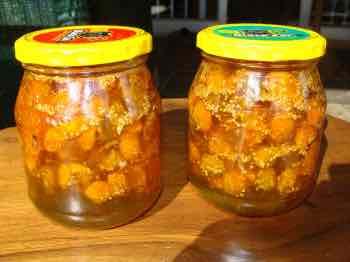
Not an attack on veganism
I hope this is not seen as an attack on veganism. I have much sympathy for their beliefs; the management of commercial husbandry today is horrific. The philosophy sits deep in our own family culture and psyche.
We choose instead to grow as much of our own food as we possibly can; and treat the bees and chickens with kindness and consideration. We do not exploit them in the negative sense of the word; no more so than a blind person using a guide dog.
So some vegans eat honey? Yes, I believe they do.
When browsing use right click and "Open Link in New Tab" or you may get a bad gateway signal.
Newsletter
Our newsletter is entitled "create a cyan zone" at your home, preserving both yourself and Mother Earth for future generations; and the family too, of course. We promise not to spam you with daily emails promoting various products. You may get an occasional nudge to buy one of my books.
Here are the back issues.
- Lifestyle and ideal body weight
- What are ultra-processed foods?
- Investing in long-term health
- Diseases from plastic exposure
- Intensive lifestyle management for obesity has limited value
- A world largely devoid of Parkinson's Disease
- The impact of friendly bacteria in the tum on the prevention of cancer
- There's a hole in the bucket
- Everyone is talking about weight loss drugs
- Pull the sweet tooth
- If you suffer from heartburn plant a susu
- Refined maize meal and stunting
- Should agriculture and industry get priority for water and electricity?
- Nature is calling
- Mill your own flour
- Bake your own sourdough bread
- Microplastics from our water
- Alternative types of water storage
- Wear your clothes out
- Comfort foods
- Create a bee-friendly environment
- Go to bed slightly hungry
- Keep bees
- Blue zone folk are religious
- Reduce plastic waste
- Family is important
- What can go in compost?
- Grow broad beans for longevity
- Harvest and store sunshine
- Blue zone exercise
- Harvest and store your rainwater
- Create a cyan zone at your home
Did you find this page interesting? How about forwarding it to a friendly book or food junkie? Better still, a social media tick would help.
- Homepage
- Our natural honey
- Do Some Vegans Eat Honey
Address:
56 Groenekloof Rd,
Hilton, KZN
South Africa
Website:
https://www.bernard-preston.com